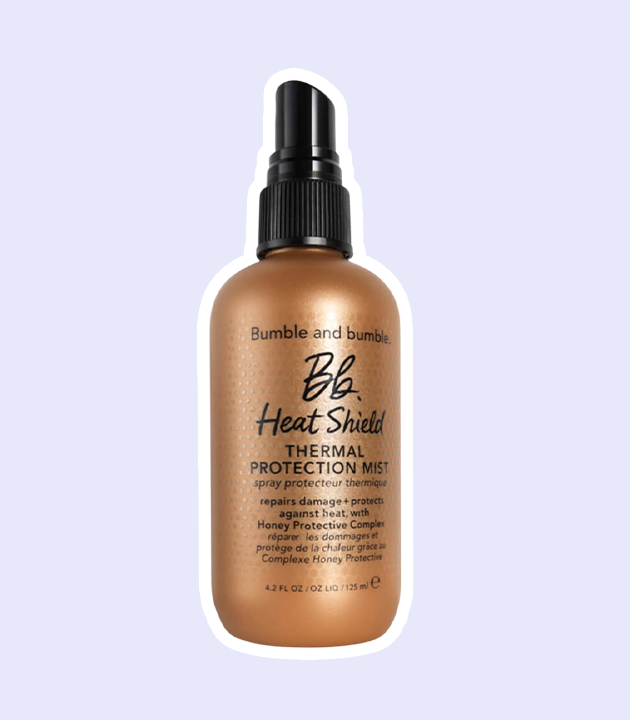
Does Heat Protectant Really Work? Well, This is What Happens When You Don’t Use it.
We owe hair a lot. Despite strenuous styling, harsh DIY dye jobs, and in-a-rush brushing, hair is able to serve up some pretty good hair days through it all. Hell, even when we’re sleeping, and if we’re not using a protective sleep style, hair is getting damaged.
The least we can do is prevent damage where possible: using a heat protectant spray. And for all you “does heat protectant really work?” naysayers out there, we’ve got the case for how heat damage can be almost totally prevented with this miracle spray. And what happens every time you don’t use it.
Read Next: Hair Hack: How To Create Heatless Curls
What Happens to Hair When You Heat Style?
Hair dryers, unless at their absolute coldest, can heat hair anywhere from 80 to 140 degrees Fahrenheit. And even though you can control the heat on your straighteners and curling irons, we know to get a good style you have to put them anywhere from 275°F and up. Pretty sure we collectively share a love affair with the 410°F setting that the lower settings don’t know about.
Even without indulging in the higher settings, when your hair heats up anywhere past 260°F, there’s a few instant types of damage that occur:
- The keratin proteins in your hair are bonded with hydrogen, and these hydrogen bonds break down, pulling out your hair’s natural oil and moisture.
- As keratin proteins are affected, your hair strength and elasticity diminish too.
- The pigments in your hair also become stripped and can change your hair colour (blondes will go a bit brassy).
- The cuticle (outer surface) of the hair cracks and frays, making hair look frizzy.
- Especially with straightening irons and curlers, moisture will evaporate from the inside of the hair.
- When you heat style often, the shape and texture of your hair is affected by “bubble hair”, an industry term for those hydrogen bonds being filled with air.
But, does heat protectant work against all this? It sure does! Ugh, we love preventable problems.
Read Next: A Protein Packed Hair Treatment With Egg
What Does Heat Protectant Do?
Simply put, heat protectant creates a barrier between the external heat of your tools and your strand. Basically (before we get into the science), heat protectant smoothes down the cuticle with a low conductive ingredient giving you sealed-in, tamed frizz and moisture too!
Now, what does heat protectant actually do to your hair while it’s working? Certain ingredients are key in protecting your hair from heat. Some popular active ingredients that are doing all the work are: PVP/DMAPA acrylates copolymer, quaternium 70, and hydrolyzed wheat protein.
When these were studied (looking at a study from 1998), they found that these common heat protectant ingredients were able to reduce damage by 10-20% at just 1% strength. The low thermal conductivity of these ingredients allowed the heat to distribute more evenly and slowed down the heat conduction.
There are tons of other ingredients that are being used now that all lean on this same “low thermal conductivity” effect too. You’ll often see silicone used and your halo hair extension even uses a very thin layer of silicone to help diminish the damage from styling too.
Read Next: Hair Hydration Treatments to Save Summer Hair
So, Does Heat Protectant Actually Work?
It does, but it doesn’t mean you can go hard on heat and forget everything you know about preventing damage. As we’ve now answered those wondering what does heat protectant do, we can understand that it reduces the quick heat effect of styling tools, slows heat transmission, and reduces the amount of heat that penetrates the hair. The key words here are “slows” and “reduces” heat.
Many studies conclude that heat protectant can only protect against up to 50% of heat that’s hitting hair. That said, 50% is huge if you’re heat styling every day! Along with reducing heat in general, adding a heat protecting shampoo and conditioner, AND using a heat protectant spray, you get quite a bit of barrier for your hair and less severe/noticeable damage. That’s something we’ll take any day!
How Can You Test Your Heat Protectant
@theaussierapunzel Bread is not hair but it’s a good visual representation of why you should always use heat protectant 🤩 #learnontiktok #tiktokpartner #hairtips ♬ Similar Sensation (Instrumental) – BLVKSHP
Thanks to TikTok [for everything in this life], we have a pretty foolproof way of testing heat protectant’s effectiveness at home. Have you heard of the toast test? Get some pieces of white bread, spray your heat protectant all over one side of the bread, and put it in the oven on broil. You’ll be able to see if your beloved heat protectant was able to protect the toast from getting hit by the heat of the broiler! Or which of your faves is better, if you test multiple.
Be careful and stick around the oven because if you’ve never used broil before, it cooks stuff quick! Lots of people do this test by using the toaster, but historically wetness and electricity aren’t amazing together, so a pan in the oven is a little safer and easier to take out.
Read Next: How to Hydrate Hair After Bleaching
Our Favourites Right Now
Dry shampoo is our biggest leap in modern science haircare this last decade, but heat protectants have also had their own big money moves too. Many of the mid-range to high-end heat protectants out there do more than just prevent damage now. You can get nourishing oil-infused moisture, detangling power, tamed flyaways, and solid UV protection along with heat protection past 400F. These are the sprays we love when we need a do-it-all heat protectant. You can press the images to shop.
Bumble & Bumble, Heat Shield Thermal Protection Mist
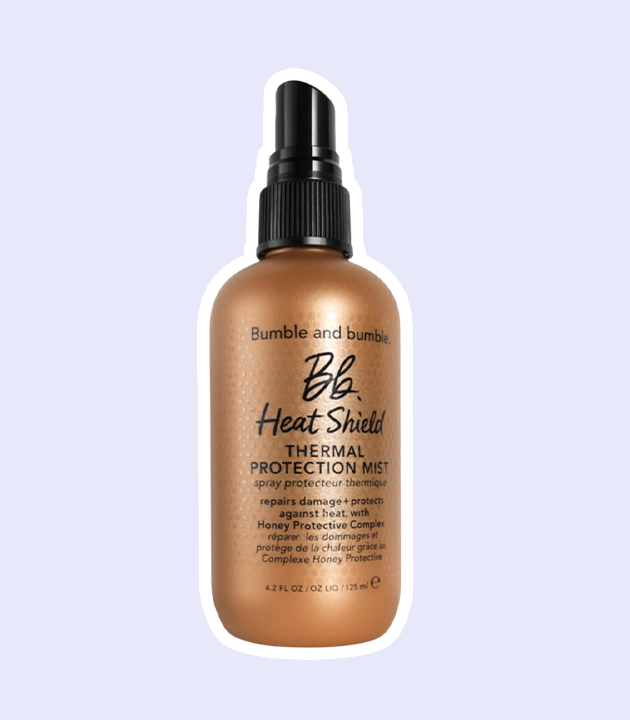
This heavy hitter protects hair against heat tools up to 450 degrees Fahrenheit! If that’s not already enough, its Honey Protective Complex also repairs damage and helps protect from further breakage (you can thank the humectant property of honey there!) Along with all that goodness, B&B boasts further conditioning, reduced frizz, and added UV filters to protect you while you’re out.
Drybar, Hot Toddy Heat Protectant Mist
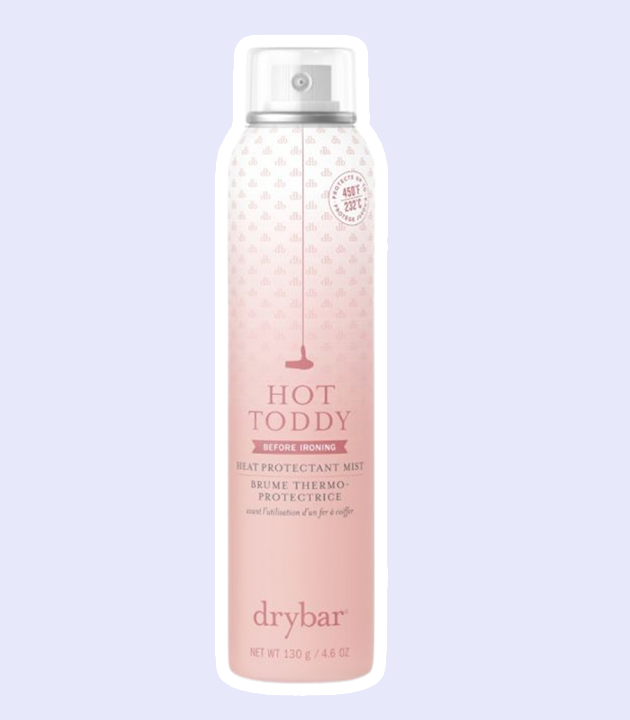
Who’d know more about heat protection than a blow dry bar? This spray uses rice protein as its active ingredient to shield from UV and excessive heat. Along with nourishing marula oil and fire tulip extract that coats hair with a satin-y finish sans residue.
Kérastase, Resistance Heat Protecting Leave In Treatment for Damaged Hair
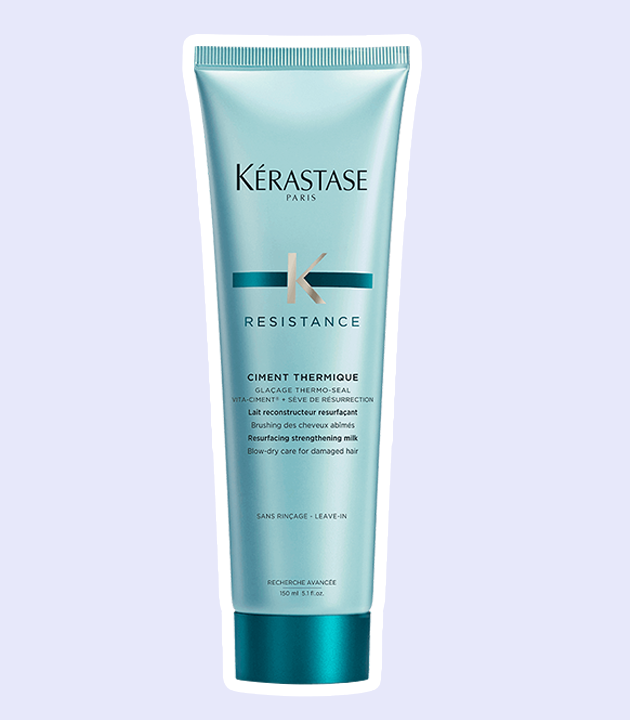

A cream variation to heat protection, Kerastase has formulated this leave-in cream with damaged ‘dos in mind. While it protects against heat up to 450°F, because it’s packed with ceramides and keratin, this protectant promises to stop breakage from blow drying by 85%. You’ll get added strength from those star ingredients too!
Amika, Blockade Heat Protectant Serum


A nutrient-packed elixir, we love this serum’s focus on preventing moisture loss and promoting frizz-free shine! Of course you’ll get heat defense using its active ingredient Dimethicone (one of the most effective heat protectants), but its lightweight formula also provides humidity protection and cuticle sealing shine. You can thank sea buckthorn berry for those benefits and that amazing smell!
UNITE, 7SECONDS Detangler
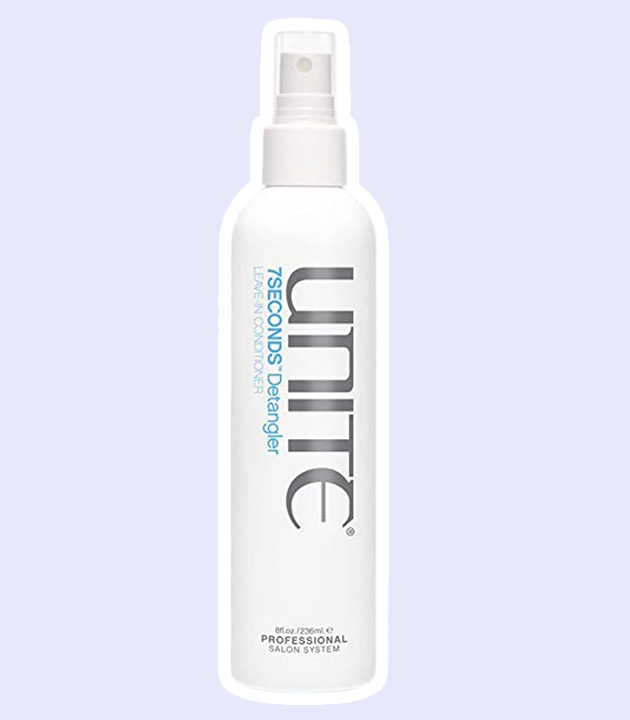

A personal favourite for its detangling power alone, the entire 7SECONDS line by UNITE is thermal and UV protecting. This leave-in conditioner meets detangler meets heat protectant spray has a protein-based formula to fortify hair’s strength when it’s most vulnerable: post-hair wash! Use this one on wet hair before a blow dry and it’ll definitely save you some damage from heat and brushing.
Care about hair health? Read these next:
- These 10 Hair Products Seriously Won’t Damage Your Hair
- What Causes Hair Breakage and How To Fix It
